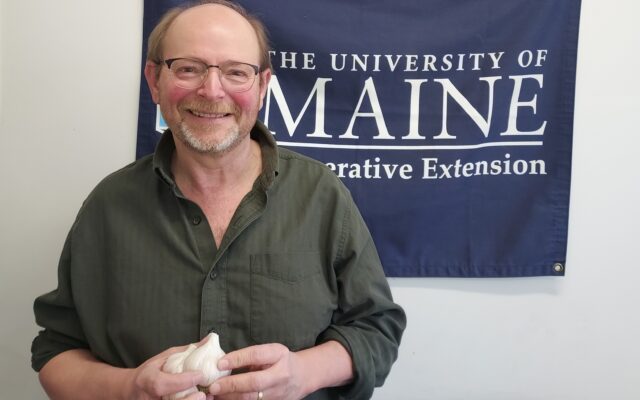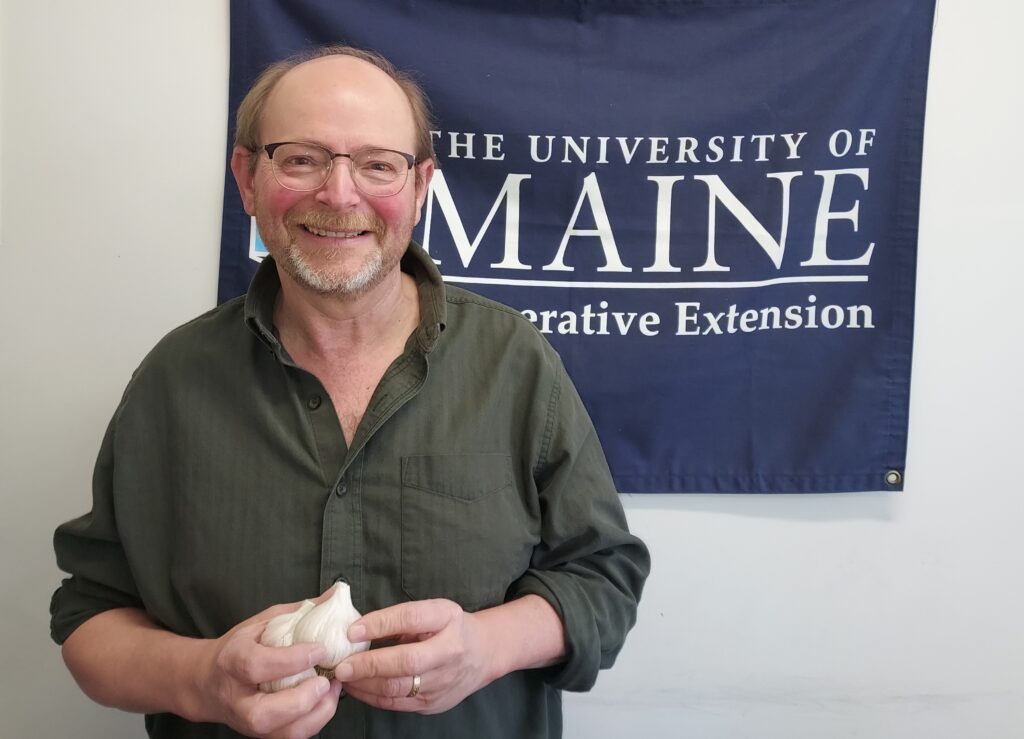
If you grow garlic in your Maine garden, thank this man
By Sam Schipani, Bangor Daily News Staff
If you have ever grown garlic in Maine, you likely have David Fuller to thank.
For nearly a quarter century, Fuller, a University of Maine Cooperative Extension agriculture expert based in Farmington, has been teaching untold numbers of Mainers how to grow hardneck garlic.
Unlike the softneck garlic that is usually found in grocery stores, hardneck garlic has a stiff stem coming up from the center of the bulb and a single row of cloves that are much more flavorful and easy to peel. While most warm weather-loving softneck garlic in Maine is imported from California or even China, cold-hardy hardneck garlic can be grown right here in Maine.
Now, as Fuller prepares to retire, he leaves behind a legacy that has changed Maine’s agriculture forever. Once a niche crop in the state, Fuller has transformed garlic into a Maine garden staple through both his research and his educational YouTube videos that have attracted a global following and been viewed by hundreds of thousands of people.

GARLIC PROMOTION – David Fuller, University of Maine Cooperative Extension agriculture and non timber forest products professional based in Farmington, who has made a career on studying and promoting hardneck garlic throughout the state of Maine.
Fuller became passionate about hardneck garlic before he even started working at the University of Maine.
“Garlic had character,” Fuller said. “It’s not grown from true seed so there’s not sexual reproduction. This garlic that you’re growing goes back thousands of years you’re working with history as well as planting a crop. It’s a really super cool plant.”
When Fuller applied to the UMaine Cooperative Extension position, he was tasked with designing and teaching a class on a topic of his choosing as part of the application process. Naturally, he chose to teach a class on hardneck garlic.
“No one else in extension was really working on garlic and I thought it had a lot of potential for the state to be a lot bigger than it was at the time,” Fuller said.
Over the course of his career, Fuller provided hands-on training for commercial growers and home gardeners alike in the cultivation, harvest, curing and storage of garlic in Maine. Fuller worked closely with his colleague, crops specialist Steven Johnson, to helm several research projects that were essential to understanding how the crop grows in the state, from how removing the garlic scape affects the size of the bulb to what happens when you plant a bulb right side up versus upside down.
Johnson said that decades ago, the only hardneck garlic he can remember seeing in Maine was found at the Common Ground Fair. Now, thanks to Fuller, hardneck garlic can be found in gardens across the state, from novices to master gardeners.
Johnson even claims that he gave Fuller his nickname, the “garlic guru.”
“He has a passion for the crop that is rare and it’s very refreshing,” Johnson said. “I think he introduced so many people to an easy vegetable to grow in the garden and one that isn’t something that most people grew up with in the garden.”
Johnson and Fuller also produced UMaine Extension publications and videos that have garnered a global garlic following.
This fall, as Fuller prepared for his impending retirement in February 2022, he needed to find a home for the 800 bulbs he had used in his research.
“I have got 40 plots of 20 bulbs each that I gather data from and I save a bunch of that to replant,” said Fuller, who wanted the bulbs to serve multiple purposes from education to supplying food pantries to helping the Wabanaki tribes in Maine establish their own foodways.
Fuller’s research garlic now has a second life in 54 locations in almost every Maine county.
Laura Hoeft, Greater Franklin Food Council’s school garden coach, received some of the donated garlic for the schools where she works. She has received garlic from Fuller in years past as well, as it makes for a good growing project for young children.
“He was super generous and donated enough garlic to plant at all of the schools with whom I work,” Hoeft said. “We ended up giving the heads as gifts to all the community members that helped out. Dave’s garlic is being spread throughout the county.”
Fuller said that in reality, garlic is only a small part of what he has worked on at the cooperative extension. He has worked with home gardeners and agricultural producers alike for crop production, as well as conducting research on non-timber forest products like birch bark and fiddleheads.
However, his work with hardneck garlic has defined his legacy in Maine. There is no telling how much garlic is growing in Maine due to Fuller’s expertise and enthusiasm over the past three decades — which, he said between tears, will continue even after he retires.
“Growing garlic is like a raindrop hitting a puddle,” Fuller said. “Other people love garlic and they share it with other people and it goes out like that.”
In the meantime, he will continue to grow garlic in his own garden — which, he said, are the direct descendents of the garlic he bought nearly three decades ago that started it all.